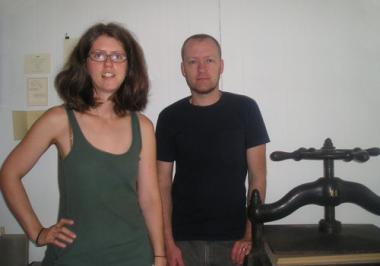When Patrick Borezo started the Autonomous Battleship Collective in 2003, he could not believe how (relatively) easy it was. The loosely-organized production company—which Borezo runs with his wife, Amy—found willing ears, open minds and immediate support in Western Massachusetts, a far cry from what he found in his efforts to orchestrate similar projects in his former home, Fitchburg.
"Day to day, it's more or less just myself and Amy, but the reason that this is even possible is because of the incredible collaborative spirit of like-minded people out here in the Valley," Borezo says. "I wanted to keep setting up shows, and as I did, I discovered all of the people doing incredible work as performers or promoters or sometimes both at the same time. It was a real revelation after the otherwise desperate atmosphere of central Massachusetts, where doing things like this felt like reinventing the wheel a lot of the time—a real quest-for-fire vibe."
Borezo adds, "Out here, we discovered up-close how real the contributions were of so many people, venues and even businesses. It's just mind-blowing to see that many people doing stuff… and even more gratifying to see them all coming out to each other's events. That signifies a community of a higher order than I'd been used to seeing."
The Autonomous Battleship Collective website states that they are "promoting an agenda of radical aesthetics." Patrick backs off from this high-minded philosophy, but only slightly. "I think it's a pretty pretentious statement in retrospect," says Borezo. "But at the time it summed up the incipient idea: to shake a slightly camp fist in the face of a criminal war and a tragicomically indifferent populace. And it was all rad fun."
The Collective has brought in top-flight national talent: the dulcet indie folk of Joanna Newsom; the lo-fi psychedelia of Devendra Banhart; even Wilco drummer Glenn Kotche's jazz outlet, On Fillmore. Though they often feature touring bands, ABC traditionally rounds out bills with local performers, helping to nurture a scene that builds upon itself through self-propagating and self-referential projects.
Many of the Borezos' shows are staged at the Montague Bookmill, but are just as likely to take place at a local library, warehouse space, or apartment near you. This serves to shake things up, but is also simply a product of economics. "To do things in the kind of shoestring way that many of us are," explains Borezo, "it really only makes sense to find spaces that are available for an evening and utilize them. There are a lot of great rooms to be used throughout the Valley, and a lot of them are very affordable for this kind of thing."
Borezo will not discriminate against certain musical genres, but the music he books and promotes is almost always in the vicinity of his taste, or at least his ideology: "I definitely book beyond simply what I would listen to on my own time, but then again, all this booking is on my own time, so I have to have an interest in whatever it is at some level. Often times it just comes down to an ambition to book a show with someone or some band that I'm really into or that I've heard about. Another aspect of that is the larger concept of putting together an interesting bill for a show, whether that means having people that are similar stylistically, or extremely different on the surface but complementary in some fundamental way."
Artistic presentation is of foremost concern to the Borezos and the Collective as a whole. "The aesthetics have always been important to us in terms of creating posters and flyers that captured the essence of the show we were putting on—at least as we perceived it," says Borezo. "To that end, we've spent a lot of late nights working or printing or otherwise fabricating things that will most likely get torn down and hopefully recycled. I just spent four hours breathing in spray paint fumes last night, as a matter of fact. I often wonder why, though I also think I am unable to stop."
Patrick and Amy are also heavily involved with literature, to the extent that they founded book-imprint Radical Readout as another outlet for their inspirations. Patrick says, "We're both involved with books in our own ways, Amy as a book artist and binder and myself as a librarian. At some point, when we realized that we could publish something ourselves and make a far more beautiful object than might otherwise get made, we just started looking for projects."
Radical Readout is currently working on its third publication, Christopher Weisman's musical theory exploration Nonmusical Patterns and Their Musical Patterns. This book will join their two other works currently in print, musician Matt Valentine's experimental novella Small as Life and Infinitesimally as Pure and former UMass student Steve Zultanski's chapbook Homoem. "Speaking of radical aesthetics, something like Steve Zultanski's work, I think, qualifies," says Borezo. "It takes a lot of intestinal fortitude to unleash the Homoem or other works like 'F the Prez.' The least we could do was put it in a book so Steve would have something to sign down at Gitmo."
For more information on Radical Readout and ABC, including an online poster gallery, visit autonomousbattleshipcollective.com.



